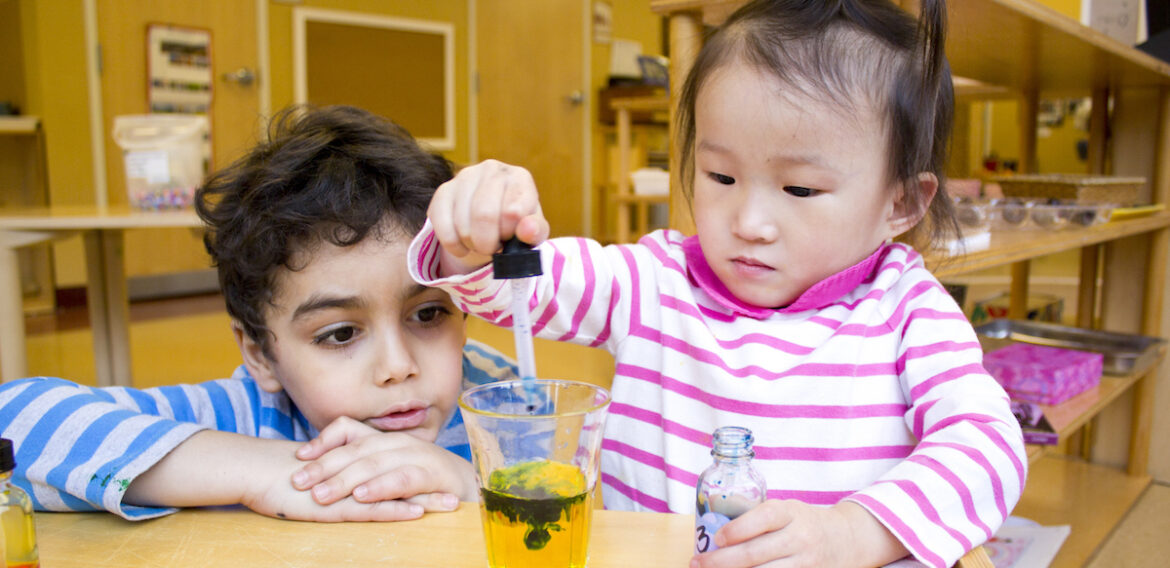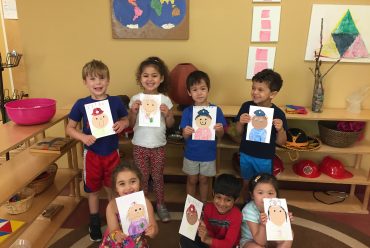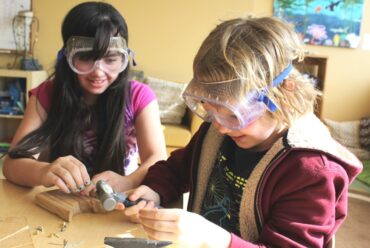Montessori Education – Frequently Asked Questions
When a child is given a little leeway, he will at once shout, “I want to do it!” But in our schools, which have an environment adapted to children’s needs, they say, “Help me to do it alone.” And these words reveal their inner needs.
– Maria Montessori
What sets Montessori schools apart from traditional schools?
While the goal of both Montessori and traditional early education is to provide children with a learning experience, there is a significant difference in the methods and approach to learning. Montessori differs from the traditional mindset that all children learn in the same way at the same pace. Instead, Montessori certified teachers observe each child and create a lesson plan according to his or her way of understanding.
Children all develop at different paces, and they have different strengths and interests. While in a traditional education every child in the class must follow one path set out by the teacher, a Montessori education follows the individual child’s interests using observation. Montessori classrooms are intentionally prepared in advance according to each child’s requirements. This includes student-centered lessons and activities where children are allowed to choose their work location, activities, and the duration of time spent on each activity.
Upon entering a Montessori classroom, you are likely to see some children sitting in groups, a few working independently, and some clustered around the teacher working on specific concepts. And throughout, you will see an intentionally organized arranged space that encourages curiosity and exploration.
How well do Montessori students do compared to students in non-Montessori schools?
There is a small but growing body of well-designed research comparing Montessori students to those in traditional schools. These suggest that in academic subjects, Montessori students perform as well as or better than their non-Montessori peers.
In one study, for example, children who had attended Montessori schools at the preschool and elementary levels earned higher scores in high school on standardized math and science tests. Another study found that the essays of 12-year-old Montessori students were more creative and used more complex sentence structures than those produced by the non-Montessori group.
The research also shows Montessori students to have greater social and behavioral skills. They demonstrate a greater sense of fairness and justice, for example, and are more likely to choose positive responses for dealing with social dilemmas.
Why do Montessori schools have multi-age classrooms?
All members of the community benefit from this setup. Older students are proud to act as role models and learn more deeply through teaching and explaining concepts to others; younger ones feel supported and gain confidence about the challenges ahead. As the children grown from mentee to mentor, this development mirrors real life. The Montessori Method is based on the belief that children’s self-esteem comes from an internal sense of pride in their own accomplishments while in a traditional classroom setting, children’s self-esteem is raised through external judgments. Internal motivation drives the Montessori classroom and sets the tone for taking responsibility for one’s own learning.
Unlike some private schools, which strive for very small classes, Montessori values the lessons of community when the size of the class is somewhat larger. Montessori classes for children above the infant and toddler level might include 20 to 30 students whose ages span 3 years.
What Are The Age Ranges Of Montessori Classes?
Most Montessori programs begin at the Early Childhood level (for children ages 2.5 – 6 years). In addition to our Primary program for Preschool and Kindergarten students, Living Montessori also has programs for Infants and Toddlers (2 months – age 3), as well as Elementary children (ages 7 – 10).
The benefits of Montessori – the emphasis on independent learning, for example, and the warm, supportive community – continue to be important at each stage of development as children grow into lifelong learners, critical thinkers, and responsible citizens of the world.
How Many Students Are In A Typical Montessori Class?
Montessori classes at the Early Childhood level and older might include 20 – 30 students whose ages span 3 years. All members of the community benefit from this configuration. Older students are proud to act as role models; younger ones feel supported and gain confidence about the challenges ahead. And all children develop their independence as they problem solve with their peers within their classroom community.
Montessori values the lessons within a community of learners that can happen when the size of the class is somewhat larger. A larger, multi-age class can encourage students to rely on themselves and their peers as resources, rather than going directly to a teacher for support first. Classes for infants and toddlers are smaller, with typically 6 – 12 children. Often the teacher-to-child ratio for this youngest age group is set by state licensing standards.
Won’t Children Fall Behind If They Learn At Their Own Pace?
Children all develop at different paces, and they have different strengths and interests. While in a traditional education every child in the class must follow one path set out by the teacher, a Montessori education follows the individual child’s interests using observation. Montessori classrooms are intentionally prepared in advance according to each child’s requirements. This includes student-centered lessons and activities where children are allowed to choose their work location, activities, and the duration of time spent on each activity.
Montessori certified teachers observe each child and create a lesson plan according to his or her way of understanding. Upon entering a Montessori classroom, you are likely to see some children sitting in groups, a few working independently, and some clustered around the teacher working on specific concepts. And throughout, you will see an intentionally organized arranged space that encourages curiosity and exploration.
Supporting Resources
- University Of Virginia – Montessori Education Provides Better Outcomes Than Traditional Methods, Study Indicates
- Journal of Psychology – Preschool Students Exhibit Significantly Greater School Year Gains with Montessori [PDF]
- National Institute for Early Education Research – Study Shows Improved Test Scores for Students in Montessori Schools.







